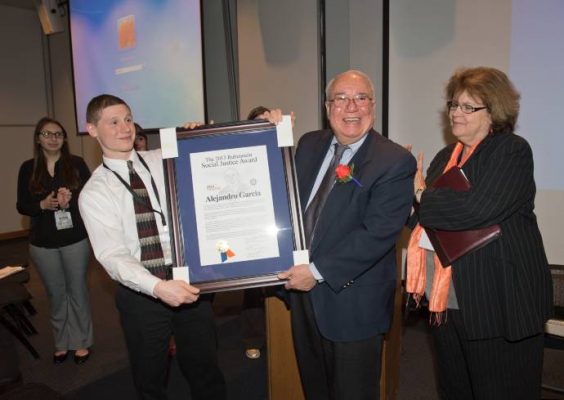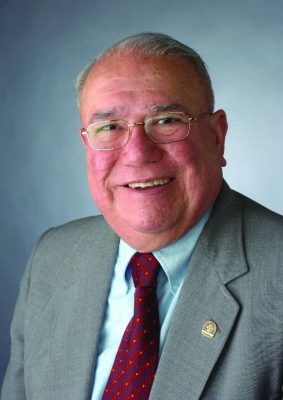
Alejandro Garcia, professor emeritus of social work at Falk College, died on November 17, 2023, at the age of 83.
A professor of social work at Syracuse University since 1978, Garcia is known as an extremely generous and committed colleague, teacher, and scholar, whose many contributions extend far beyond the university’s boundaries. He has taught gerontology, social policy, and human diversity courses for more than 43 years, shaping the Falk College School of Social Work and generations of students. He held the Jocelyn Falk Professorship in Social Work at the time of his retirement in 2021.
Alejandro Garcia
“Alejandro had a deep personal commitment to promoting social, racial, and economic justice, especially for older adults, Hispanic people, and many others,” says Eric Kingson, also a professor in the Falk College School of Social Work and a close friend of Garcia for 45 years. “He made lifelong relationships with people and impacted the lives of many as a social worker, teacher, mentor, advocate, researcher — and as a friend. The kind of friend who is like family.”
Carrie Smith, a professor in the Falk College School of Social Work, remembers Garcia as a cherished member of the social work and Falk College and Syracuse University communities and one of the first people to welcome her to the School of Social Work more than 28 years ago. “His interest and outreach beyond the university are evident in the numerous awards and honors he received over a lifetime of dedicated service to promoting social justice and improving the lives of all people, especially those who have experienced oppression,” Smith says. “He was a dedicated professional who worked tirelessly to teach his students to understand the importance of committed, competent and sometimes courageous social work endeavors.”
“I am indebted to him for his kindness and generosity to me over the years. We will miss him, but, just as importantly, we will always remember him,” Smith says.
Garcia grew up in one of the poorest neighborhoods in Brownsville, Texas, one of six children of parents who had immigrated from Mexico. After learning English in primary school, he was recognized as an outstanding student. His musical talent got him into the best high school in Brownsville at a time when discrimination and racism limited such opportunities.
Garcia was one of very few Hispanics to attend the University of Texas, and after graduation he joined the United States Army. He earned a Master of Social Work (MSW) from California State University, Sacramento, where years later he received the Distinguished Service Award and was appointed by its School of Social Work as a “Social Work Educator of the Contract.” He has been appointed by the National Association of Social Workers (NASW) to fill a new leadership role as National Student Coordinator.
Encouraged by NASW leadership to pursue doctoral studies, Garcia was accepted a few years later into the Florence Heller School of Advanced Study in Social Welfare at Brandeis University. This led to one of the first studies on the economic situation of elderly Chicanos and Ticanas, a dissertation titled “The Contribution of Social Security to the Income Adequacy of Older Mexican Americans.” He is an elected member of the National Academy of Social Security and a Fellow of the Society on Aging of America, and has also been named by NASW as a “Leader in Social Work.”
Jennifer Genovese, an assistant teaching professor in the College of Social Work, first met Garcia when she was a student at Syracuse. Garcia was one of her professors, and when she earned her MSW in 1983, he spoke at the convocation ceremony.

Alejandro Garcia received the 2013 Dan and Mary Lou Rubinstein Prize for Social Justice, which was presented by then-Falk College Dean Diane Leiden-Murphy on behalf of the School of Social Work.
Genovese recalls the words he shared that day, which were later published in his article, “Latino Reflections on the Social Work Profession” (2014):
I suggest that there has never been a greater need for the social work profession to be the conscience of society. Now is the time for our voices to be heard: to reiterate our commitment to those who cannot take care of themselves, to denounce the age of narcissism and ethnocentrism, and to re-establish the humanism that has been a staple of American society. We must hear. We must speak and be guided by the spirit that comes from the depths of our hearts and the wisdom of our minds. We have guiding principles that talk about the dignity of the individual and defending the oppressed. By aligning our voices, we can be heard, and we can work to achieve effective change. We can reclaim our place as the conscience of American society. We must keep our priorities clear: we have a responsibility to those who cannot provide for themselves. We have responsibilities to continue our relentless efforts towards eliminating poverty, racism, sexism and homophobia. We cannot allow our society to surrender to narcissistic, self-serving interests. We cannot allow what Karl Rowen calls “the spirit of meanness” to prevail in this country. We must ensure that terms such as compassion, commitment, social justice, and equality remain an integral part of our vocabulary and our primary focus. Only then can we confirm the meaning of our profession.
“Alejandro Garcia’s inspiring words from 1983 will still ring true in 2023 and remain part of his everlasting legacy,” says Dr. Genovese.
Over the years, Garcia has served in many other leadership roles, including most recently as an honorary board member of the Syracuse Rescue Mission, chair of AARP’s National Policy Council, president of the National Hispanic Council on Aging, and a board member of the Syracuse Hispanic Association of Retirees . Labor Association, Council on Social Work Education and NASW. He was awarded Scholar/Educator of the Year at Syracuse University and has been recognized as a “Hometown Hero” by the National Veterans Resource Center. He served as Director of the School of Social Work for two years and assumed many other leadership roles.
Garcia has co-edited three books, including “Older Latinos: Issues and Solutions for the 21st Century” (with Marta Sotomayor in 1993), and “Issues and Prevention for Youth Affected and Vulnerable by HIV” (with Susan Taylor Brown in 1999), and “La Familia: Traditions and Realities” (with Sotomayor in 1999). He has also authored numerous articles and book chapters and served on the editorial boards of several social work journals and the Encyclopedia of Social Work.
Notably, Garcia was a remarkably kind, generous and sociable man who loved spending time with family and friends, sharing with them his sense of humor and laughter and his vast knowledge of art, literature, Spanish culture, social work, Syracuse and much more.
The Falk College family extends its deepest condolences to Dr. Alejandro Garcia’s family, friends, colleagues, and students.
By faculty colleague Alejandro Garcia. Obituary excerpts used with permission of the author.
Falk College at Syracuse University is deeply saddened by the passing of Professor Emeritus Alejandro Garcia, a beloved member of our community. His dedication to teaching and his impactful research within the fields of social work and Hispanic studies made a lasting impression on his colleagues and students alike. We remember him as a passionate educator and mentor, and his influence will continue to be felt within the college for years to come.

